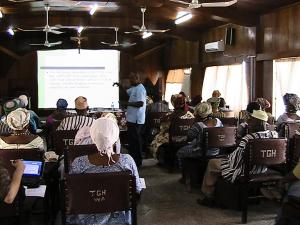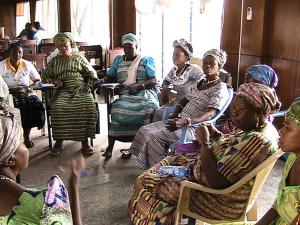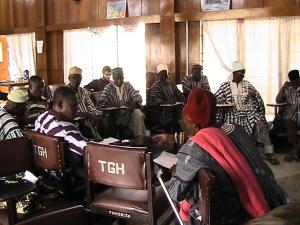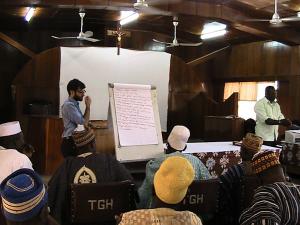Adressing Climate Change - Foundation Office Ghana
Event Reports
“We cannot discuss democracy if the environment is not conducive for humans to survive” - In his opening remark, the Programme Officer of KAS Dr. Isaac Owusu-Mensah pointed out the need “to focus on what we are leaving behind for our grandchildren. This is possible if we collectively look at it from the traditional perspective, e. g. by inviting traditional leaders to this course”, he added.
Mr. Bern Guri, Executive Director of CIKOD, added: “With climate change stirring us horrible in the face, there is the need to consider what systems we were previously using to preserve and manage water in our localities and how we can improve these systems and reincorporate them into our current practices.”
On these issues, the two organizations presented a programme to the roughly 40 particpants of the workshop, starting with a presentation by Mr. Mohammad Assah, an expert on climate change issues. Using comparison photos to demonstrate water depletion in the Volta Basin, he demonstrated the effect of climate change on one’s livelihood. He also provided detailed information on climate change at the international level – highlighting the Earth Summit and Kyoto Protocol.
At the national level, he made mention of Ghana’s REDD Preparation Plan, Ghana’s Adaptation Strategy, Ghana’s climate change policy (being still in draft form) – but emphasized that a bottom-up/local approach is needed since providing money to governments is not sufficient to reach those who are most vulnerable.
Most importantly, Mr. Asaah encouraged participants to think about the practical examples of climate change in their own communities such as floods and droughts in the Volta Basin, shortening of rainy season in some places from six months to three.
In a next step, Mr. Bern Guri posed a number of thought-provoking questions which engaged participants in considering the realities of their own communities and, importantly, their role in helping their communities to mitigate and adapt to climate change. Together with the group of mainly Traditional Leaders, the following effects of climate change in the Upper West Region were pointed out:
•Low food production will result in food insecurity and malnutrition.
•Low income from food production further brings hardships to rural women and undermine their daily struggle to cope with marginal resources of food and water.
•Low employment: The region is one of the poorest in Ghana. Farming is the major source of employment but with the impact of Climate Change, it will further reduce the employment opportunities of the people.
•Increase in diseases and conflict.
•Reduced access to agriculture products for social activities such as funerals and other social activities is also being anticipated.
Possible Mechanism for Adaptation to Climate Change in UWR were also considered:
•Promote improved indigenous seeds and crops which are better adapted to the erratic weather patterns in the region (sonsogoli, bambara beans etc.). These should be promoted for food security and climate change adaptation.
•Conservation Farming - Conservation agriculture that combines organic manures and permanent soil cover are promising adaptation options for their ability to increase water holding capacity of soils. This can have an enormous impact on adaptation to drought, heavy rains and winds.
•Food preservation – Traditional ways of preserving food such as drying, salting and smoking should be encouraged in the Region for managing food availability
The following day was meant for a group assignment where each of the participating groups (Chiefs, Traditional Women Leaders, District Assembly Members) discussed among themselves the way forward and later on gave a presentation on their concrete approach to react to climate change.
At the end of the workshop, participants agreed that if there is to be any progress in climate change and food security issues, then a lot will depend on how Traditional Authorities use the education they had at the workshop in their various communities.







